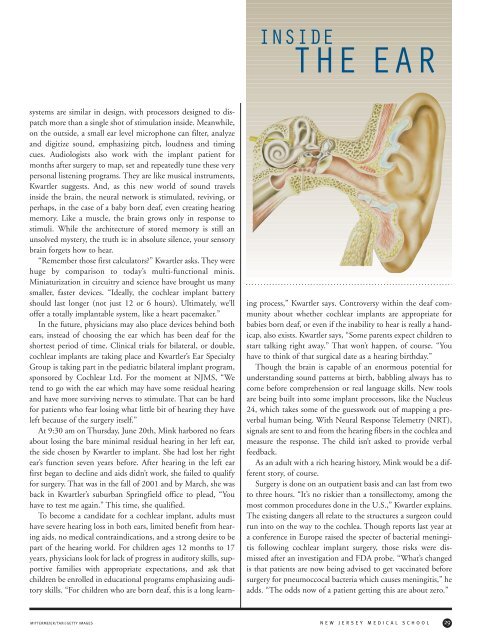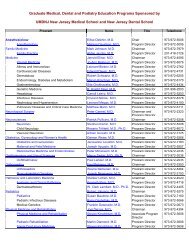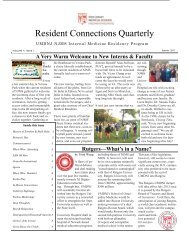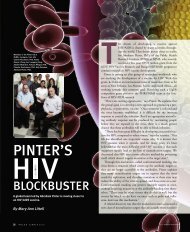changing the course of stroke - New Jersey Medical School ...
changing the course of stroke - New Jersey Medical School ...
changing the course of stroke - New Jersey Medical School ...
You also want an ePaper? Increase the reach of your titles
YUMPU automatically turns print PDFs into web optimized ePapers that Google loves.
systems are similar in design, with processors designed to dispatch<br />
more than a single shot <strong>of</strong> stimulation inside. Meanwhile,<br />
on <strong>the</strong> outside, a small ear level microphone can filter, analyze<br />
and digitize sound, emphasizing pitch, loudness and timing<br />
cues. Audiologists also work with <strong>the</strong> implant patient for<br />
months after surgery to map, set and repeatedly tune <strong>the</strong>se very<br />
personal listening programs. They are like musical instruments,<br />
Kwartler suggests. And, as this new world <strong>of</strong> sound travels<br />
inside <strong>the</strong> brain, <strong>the</strong> neural network is stimulated, reviving, or<br />
perhaps, in <strong>the</strong> case <strong>of</strong> a baby born deaf, even creating hearing<br />
memory. Like a muscle, <strong>the</strong> brain grows only in response to<br />
stimuli. While <strong>the</strong> architecture <strong>of</strong> stored memory is still an<br />
unsolved mystery, <strong>the</strong> truth is: in absolute silence, your sensory<br />
brain forgets how to hear.<br />
“Remember those first calculators?” Kwartler asks. They were<br />
huge by comparison to today’s multi-functional minis.<br />
Miniaturization in circuitry and science have brought us many<br />
smaller, faster devices. “Ideally, <strong>the</strong> cochlear implant battery<br />
should last longer (not just 12 or 6 hours). Ultimately, we’ll<br />
<strong>of</strong>fer a totally implantable system, like a heart pacemaker.”<br />
In <strong>the</strong> future, physicians may also place devices behind both<br />
ears, instead <strong>of</strong> choosing <strong>the</strong> ear which has been deaf for <strong>the</strong><br />
shortest period <strong>of</strong> time. Clinical trials for bilateral, or double,<br />
cochlear implants are taking place and Kwartler’s Ear Specialty<br />
Group is taking part in <strong>the</strong> pediatric bilateral implant program,<br />
sponsored by Cochlear Ltd. For <strong>the</strong> moment at NJMS, “We<br />
tend to go with <strong>the</strong> ear which may have some residual hearing<br />
and have more surviving nerves to stimulate. That can be hard<br />
for patients who fear losing what little bit <strong>of</strong> hearing <strong>the</strong>y have<br />
left because <strong>of</strong> <strong>the</strong> surgery itself.”<br />
At 9:30 am on Thursday, June 20th, Mink harbored no fears<br />
about losing <strong>the</strong> bare minimal residual hearing in her left ear,<br />
<strong>the</strong> side chosen by Kwartler to implant. She had lost her right<br />
ear’s function seven years before. After hearing in <strong>the</strong> left ear<br />
first began to decline and aids didn’t work, she failed to qualify<br />
for surgery. That was in <strong>the</strong> fall <strong>of</strong> 2001 and by March, she was<br />
back in Kwartler’s suburban Springfield <strong>of</strong>fice to plead, “You<br />
have to test me again.” This time, she qualified.<br />
To become a candidate for a cochlear implant, adults must<br />
have severe hearing loss in both ears, limited benefit from hearing<br />
aids, no medical contraindications, and a strong desire to be<br />
part <strong>of</strong> <strong>the</strong> hearing world. For children ages 12 months to 17<br />
years, physicians look for lack <strong>of</strong> progress in auditory skills, supportive<br />
families with appropriate expectations, and ask that<br />
children be enrolled in educational programs emphasizing auditory<br />
skills. “For children who are born deaf, this is a long learn-<br />
MITTERMEIER/TAXI/GETTY IMAGES<br />
INSIDE<br />
THE EAR<br />
ing process,” Kwartler says. Controversy within <strong>the</strong> deaf community<br />
about whe<strong>the</strong>r cochlear implants are appropriate for<br />
babies born deaf, or even if <strong>the</strong> inability to hear is really a handicap,<br />
also exists. Kwartler says, “Some parents expect children to<br />
start talking right away.” That won’t happen, <strong>of</strong> <strong>course</strong>. “You<br />
have to think <strong>of</strong> that surgical date as a hearing birthday.”<br />
Though <strong>the</strong> brain is capable <strong>of</strong> an enormous potential for<br />
understanding sound patterns at birth, babbling always has to<br />
come before comprehension or real language skills. <strong>New</strong> tools<br />
are being built into some implant processors, like <strong>the</strong> Nucleus<br />
24, which takes some <strong>of</strong> <strong>the</strong> guesswork out <strong>of</strong> mapping a preverbal<br />
human being. With Neural Response Telemetry (NRT),<br />
signals are sent to and from <strong>the</strong> hearing fibers in <strong>the</strong> cochlea and<br />
measure <strong>the</strong> response. The child isn’t asked to provide verbal<br />
feedback.<br />
As an adult with a rich hearing history, Mink would be a different<br />
story, <strong>of</strong> <strong>course</strong>.<br />
Surgery is done on an outpatient basis and can last from two<br />
to three hours. “It’s no riskier than a tonsillectomy, among <strong>the</strong><br />
most common procedures done in <strong>the</strong> U.S.,” Kwartler explains.<br />
The existing dangers all relate to <strong>the</strong> structures a surgeon could<br />
run into on <strong>the</strong> way to <strong>the</strong> cochlea. Though reports last year at<br />
a conference in Europe raised <strong>the</strong> specter <strong>of</strong> bacterial meningitis<br />
following cochlear implant surgery, those risks were dismissed<br />
after an investigation and FDA probe. “What’s changed<br />
is that patients are now being advised to get vaccinated before<br />
surgery for pneumoccocal bacteria which causes meningitis,” he<br />
adds. “The odds now <strong>of</strong> a patient getting this are about zero.”<br />
N EW JERSEY MEDICAL SCHOOL 29






